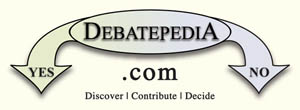I just came across this though apparently it’s been up and running since last summer. Debatepedia is a free, wiki-based encyclopedia where people can collaboratively research and write outlines of arguments on contentious subjects — stem cell reseach, same-sex marriage, how and when to withdraw from Iraq (it appears to be focused in practice if not in policy on US issues) — assembling what are essentially roadmaps to important debates of the moment. Articles are organized in “logic trees,” a two-column layout in which pros and cons, fors and againsts, yeas and neas are placed side by side for each argument and its attendant sub-questions. A fairly strict citations policy ensures that each article also serves as a link repository on its given topic.
 This is an intriguing adaptation of the Wikipedia model — an inversion you could say, in that it effectively raises the “talk” pages (discussion areas behind an article) to the fore. Instead of “neutral point of view,” with debates submerged, you have an emphasis on the many-sidedness of things. The problem of course is that Debatepedia’s format suggests that all arguments are binary. The so-called “logic trees” are more like logic switches, flipped on or off, left or right — a crude reduction of what an argument really is.
This is an intriguing adaptation of the Wikipedia model — an inversion you could say, in that it effectively raises the “talk” pages (discussion areas behind an article) to the fore. Instead of “neutral point of view,” with debates submerged, you have an emphasis on the many-sidedness of things. The problem of course is that Debatepedia’s format suggests that all arguments are binary. The so-called “logic trees” are more like logic switches, flipped on or off, left or right — a crude reduction of what an argument really is.
I imagine they used the two column format for simplicity’s sake — to create a consistent and accessible form throughout the site. It’s true that representing the full complexity of a subject on a two-dimensional screen lies well beyond present human capabilities, but still there has to be some way to present a more shaded spectrum of thought — to triangulate multiple perspectives and still make the thing readable and useful (David Weinberger has an inchoate thought along similar lines w/r/t to NPR stories and research projects for listeners — taken up by Doc Searls).
I’m curious to hear what people think. Pros? Cons? Logic tree anyone?
if:book
A Project of the Institute for the Future of the Book
